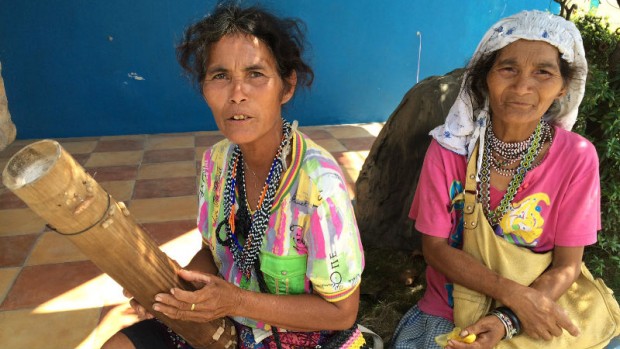‘Lumad’ celebrate with Davao folk

‘LUMAD’ IN THE CITY These women have joined thousands of “lumad” (indigenous people) who left their hinterland villages to roam the streets of Davao City to ask residents for Christmas gifts. NICO ALCONABA/ INQUIRERMINDANAO
DAVAO CITY—In this city of more than 1 million people, Christmas could mean two things: really silent nights and thousands of visitors from indigenous communities coming down to celebrate with residents.
To outsiders, particularly those from neighboring provinces, the Christmas season here—which, by tradition, typically runs for the entire month of December—is both a joyous and a burdensome affair.
For one, visitors could only marvel at its perennial feat of recording zero firecracker-related injuries due to the strict implementation of the ban on setting off firecrackers and the like during the Christmas and New Year’s Eve revelries.
A city ordinance banning the sale, distribution and use of firecrackers has saved the limbs and lives of thousands of citizens for the last 15 years, amid the rising number of firecracker casualties across the country. This has boosted calls from various sectors for a nationwide ban.
During the celebrations that ushered in 2015, at least 28 people were taken to hospitals in southern Mindanao owing to firecracker injuries. None of them came from Davao City, according to police.
Article continues after this advertisementFiring guns
Article continues after this advertisement“I’m happy about the ban because it has meant safer and noise-free nights for me and my family,” said resident Ruben Lee, a radio technician.
Having lived outside the city, Lee recalled getting disgusted with people who lit up firecrackers as if these were cigarettes and tossing them even in the middle of a crowd, to the consternation of terrified bystanders.
What’s worse, he said, revelers could use—and had used—guns to light up the skies, causing fatalities, without getting caught.
Hospitals in Davao, particularly those owned by the government, are still getting firecracker casualties, but they originate from other areas.
Raucous but safe
In lieu of this, the Davao folk have come up with ways to celebrate Christmas raucously but safely, such as by blowing torotot (paper horns). In fact, the city will be celebrating its 3rd Torotot Festival on Dec. 31, with cash and other prizes up for grabs.
Residents credit the success of the firecracker ban to the will of the local government in meting out punishment to offenders, ranging from fines of up to P5,000 and imprisonment of several months, or both.
Other areas outside the city have tried in recent years to adopt the ban, or at least regulate firecrackers during holidays, a step closer to banning their use.
Another sight common in the city during the holidays are the thousands of indigenous peoples (“lumad”) who descend from the mountains and from nearby Mindanao areas, like Davao del Norte, Agusan del Sur and Bukidnon, to share with city dwellers the gifts of the season.
According to the city social services and development office, at least 11,000 families, or about 30,000 people, from lumad communities came during the Christmas season last year.
The city government has accommodated them, housing them in public gymnasiums in the districts and villages of Bankerohan, Buhangin, Bunawan, Matina Aplaya, Matina Crossing and Tugbok, as well as providing them with foodstuff, clothing and other goodies.
Social welfare officials said the local government had been allocating funds for the purpose, with Mayor Rodrigo Duterte ordering them not to shoo away the visiting lumad.
Sharing joys
There have been instances though when lumad people have died after being hit by cars in city roads, or succumbing to illnesses.
Officials said the lumad people were not being lured to visit Davao but that the local government was simply trying to take care of visitors who would want to experience what the Christmas season is.
The city government usually facilitates the people’s return to their communities by Dec. 26.